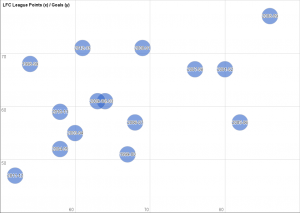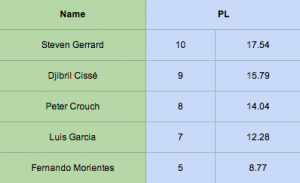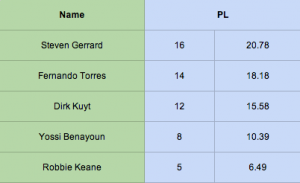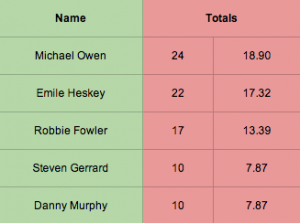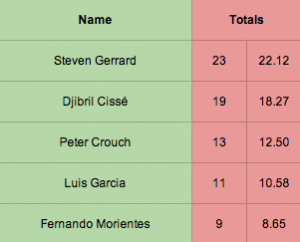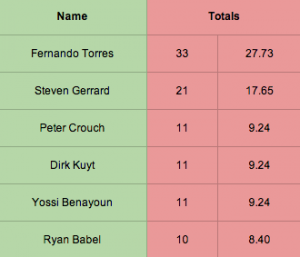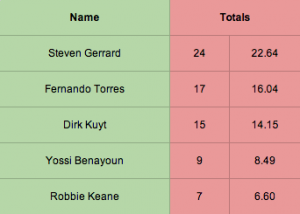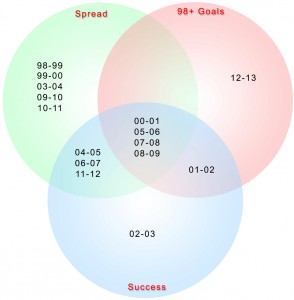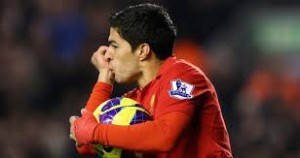By Ray Wilson.
At the time of writing, Liverpool Football Club find themselves somewhat at odds with star striker Luis Suarez. The mercurial Uruguayan may have been the beloved hero of 2012-13, but recent flirtations towards Real Madrid have somewhat soured his reputation amongst the fans. In fairness to him, with multiple translations, reiterations presented as breaking news and mixed messages from a range of sources, it isn’t the clearest of situations. But if we could take a punt… he probably wouldn’t mind a move to sunny Spain.
For some, this would be a terribly damaging blow for the Reds, and in many ways they could be right. Over the course of last season El Pistolero scored 30 times; he contributed 30.61% of Liverpool’s goals in all competitions, a figure bettered by nobody from 98-99 to the present day. Take those goals away and surely success would prove too hard to find, with the club instead resigned to wallow in the squalor of mediocrity, destined for years of barren campaigns and empty endeavours?
Well… maybe… or perhaps that’s simple hyperbole with too much gut emotion and not enough fact. In the wake of this, with many fretting over how we could replace his end product, I decided to look into Liverpool’s recent goalscoring history, with the hopeful aim of discovering trends that may prove comforting and show you that there would, of course, be life after Luis Suarez.
I will be discussing the period covering 98-99 to 12-13 with data obtained from LFCHistory.net, which I then duly manipulated thereafter.
The Premier League
Firstly, let’s take a look purely in terms of the Premier League. The following graph showcases the relationship between the number of league goals scored, and the corresponding points collected by Liverpool on a season-by-season basis.
Generally there’s a linear relationship; the more goals you score, the more points you receive in a reasonably proportionate manner. But as you can see, there are some exceptions. This season and 98-99 both saw far more goals scored than usual given the amount of points received. At the other end of the scale is, for me, one of our most interesting seasons from a statistical perspective: 2005-06.
Success without goals, you say? Impossible! If you don’t score you can’t win.
This would be true, but let’s remember that a 1-0 victory is more useful to the team than a 3-3 draw. You may score more goals in one game, but the other provides more points, which is a currency of far greater value. So although you do need to score, you don’t necessarily have to score that many.
In 05-06, Steven Gerrard topped the list of league goalscorers. His almighty tally? 10 goals. Take a look at the top five below. You’ll notice another number to the right, which represents their percentage contribution to the overall total of the given category.
A low scoring, but evenly spread bunch. The Reds bagged just 57 league goals that year, and whilst this fact alone sounds very unimpressive, the team still secured 82 points, the club’s second greatest Premier League total. Perhaps the key was the even spread, with no single player seemingly holding a disproportionate amount of power over Liverpool’s ability to score. This trend is similarly evident in 08-09 where we recorded our best ever return of 86 points. With 77 league goals scored, this means we netted twenty extra times but were only four points better off. The top scorers this time around, as you may expect, posted larger figures.
Again, in terms of distribution, the spread is reasonably even. What I mean by this is that no one player destroyed the rest; each rung of the ladder is just a small step down, as opposed to the 13 goal drop you might notice between Suarez and Sturridge’s figures this year. Of course, in that case, Sturridge only played half the season with us, but the point of uneven weighting remains.
This is not to say that an even spread is a requirement for league success. When Houllier’s men finished with 80 points in 01-02, Michael Owen’s total of 19 goals was more than double that of second placed Emile Heskey who only scored nine goals. Similarly, with 76 points in 07-08, Torres’ total of 24 goals blew Gerrard’s second placed 11 goals out of the water. For the record, 76 points is the highest amount posted by a fourth placed team since 01-02 when fourth place began to grant qualification to the Champions League.
In the seasons covered here, Liverpool only twice saw a league goalscorer surpass 20 goals, whilst still enjoying numerous domestic campaigns that would be deemed more than acceptable if we enjoyed them next season. Of course we would prefer to score as many goals as possible with a top scorer in unbelievable form, but history shows it’s certainly not a fixed requirement for success.
The Champions League
We may not grace this fabled competition right now, but I still think it’s worth taking a brief moment to analyse some numbers here for a bit of perspective.
Our greatest return came in 07-08 when we scored 34 times, but fell short at the semi-final. 23 goals were scored en-route to a quarter-final finish in 2001-02, with one less goal producing the same result in 08-09. When we made the final the figures were comparatively low, with just 20 goals securing the win in 04-05 and 22 goals enough for runners-up medals in 06-07. Given those kind of figures were posted by teams who could do no better than the quarter-finals, I think it’s fair to say that both teams who graced their respective finals were relatively modest in front of goal.
So again, we see evidence of success without excessive goalscoring.
Total Goals
Four seasons have seen total goal tallies surpass the hundred mark. 2000-01 will come as no surprise with victories in the Europa, FA and League Cups punctuating a third place finish in the league. 127 goals were scored, which still stands as a record high for the period covered here. The following is a list of our top five goal scorers in all competitions, both with their total goals and percentage contribution to the total.
The top three strikers enjoyed healthy success in front of goal, with ample support from midfield not too far behind. Lots of goals were scored, but there was no striking dependency on any one player.
Fast forward to 2005-06 where we scored 104 times on our way to a third place finish with 82 points, plus an FA Cup win, Super Cup victory and an appearance in the final of the positively wacky Club World Cup.
These figures are much healthier than the low league returns exhibited that year, and still nicely solid all around. Again, there is no heavy weighting upon one individual.
In 2007-08 we scored a massive 119 goals, finishing fourth with 76 points and an appearance in the semi-finals of the Champions League. The domestic cups drew less success with appearances in the last 16 (FA Cup) and quarter-final (League Cup) respectively. This time I’d like to show you the top six.
Six players with 10 or more goals is unique to this season. The weighting is a little more top heavy than we’ve previously seen, but with a lot more overall goals and impressive tallies stretching further down the list, it’s not hard to see how we bagged so many points alongside a Champions League run. There were plenty of players getting respectably involved, ably supplementing the two main men. At the same time, we only finished fourth and didn’t particularly impress in the domestic cups so, all the same, lots of goals doesn’t necessarily guarantee success.
Finally, in 08-09, we bagged 106 goals as we finished second with 86 points. Elsewhere, however, you might say we under-performed, with two domestic fourth round exits sitting alongside a quarter-final Champions League return in the file marked disappointment.
A good spread once again, but lesser tallies for all but one place on the list with only Kuyt’s third placed 15 goals surpassing Crouch’s 11 goals from the year before. Gerrard was at his peak here; as well as topping the league goalscoring charts he also returned seven goals in the Champions League. Dirk Kuyt lagged behind with three goals.
The Landscape
What I think I’ve shown so far is that whilst there are some trends, there’s also a lot of everything happening under different conditions as well – results are scattered. Some years we’ve scored lots of goals, others we haven’t. Some years we’ve been overly dependant, others the team has carried the burden more equally. And, of course, some years we’ve enjoyed great success, whilst we know that at other times we’ve whimpered through the year without much to shout about.
I thought it would be interesting, then, to create a Venn diagram and place each season within a designated section. To my mind, the ultimate trio would be scoring a lot of goals with a reasonable spread throughout the team, and for that team to be validated with success. There are a few things to consider first, however. Chiefly, what have I classified as a lot of goals? Well this is how our total goals looks from top to bottom over the past fifteen years:
- 127 – 2000-01
- 119 – 2007-08
- 106 – 2008-09
- 104 – 2005-06
- 99 – 2001-02
- 98 – 2012-13
- 93 – 2002-03
- 90 – 2006-07
- 87 – 1998-99
- 84 – 2009-10
- 82 – 2004-05
- 80 – 2003-04
- 79 – 2011-12
- 77 – 2010-11
- 63 – 1999-00
It’s worth noting that some seasons have seen more competitions and as such presented more opportunities to score, so there’s no even playing field here. Still, I’ll be tight and say 98 goals and above counts as worthy of note. With success, that’s a tough one. Take Kenny Dalglish’s 11-12 season as the perfect example. You can have waves of Liverpool fans irately and seemingly eternally debating whether the cup runs counter-balanced the severely underwhelming league efforts. I decided to be rather broad and define success as simply winning something and/or qualifying for the Champions League. With this in mind, take a look at how I placed each season:
Statistics never tell the full story and in this case, with my decidedly woolly definitions of success and “lots of goals”, perhaps that’s as true as ever. But I have stumbled across some trends which are still quite interesting. Chiefly, notice that there is not a single instance of 98+ goals with a good spread, without success. Perhaps this shows that if you want to be toting a fine cigar come May, what you really need to do is focus on building a high scoring team with a host of quality spread throughout as opposed to one or two superstars.
There have been four seasons which ticked all three boxes. The two obvious seasons tail-end the list, with the middle two perhaps requiring an extra word of support. In 05-06 we delivered a lot of league points on the back of a modest, low-scoring team with a superb defence. In other competitions the even scoring continued, and the goals flooded in on the way to FA Cup glory. Meanwhile, 07-08 may seem a little oddly placed, but a Champions League SF is a whisker away from the big stage itself, and 76 points for fourth place, as said, is a record. The next best was Arsenal this season with 73 points, a full victory behind.
01-02 saw dependence on Michael Owen; 99 goals in total squeaks into the goals category, and the respectable league finish enjoyed supplement from a Super Cup and a Charity Shield, for what they’re worth. It is one of only two instances of dependence leading to success. Elsewhere, 02-03 is the sole instance of success with neither a good spread nor a lot of goals. Although in fairness, 93 goals is not a world away from the cut-off point, so bare that in mind. The success itself, the League Cup, is quite modest alongside a much depreciated points tally (64 points in fifth place, down from 80 points in second place the year before). By my preset definitions, however, that’s where it sits. Finally, as if I didn’t already consider it an anomalous campaign, Brendan Rodgers’ debut season sits alone in the sphere of goals, punctuated neither by a good spread of goals nor any notable success. For most it has been entirely forgettable, but we can see here that from a statistical standpoint it’s actually very interesting.
Now if you remember back to the introduction, this study was sparked off the back of Luis Suarez’s possible departure. We were undoubtedly dependant on him this season, but should we fear the loss of the key man? Although I wouldn’t label any of these outcomes as definitive, exact science, my work here appears to suggest not. Whilst two of the three dependant seasons have brought some success, seven of the nine seasons in which success was achieved also saw a good spread of goalscorers. What this tells me is that anything is possible but, at least in our recent history, success comes largely without dependence on a single player.
So whilst Luis Suarez may take his wonderful talent and magnificent goal contributions elsewhere, given the above – and the fact that we will of course look to recruit able replacements, I think we’ll be okay. Remember, there was life after Kenny, Rushie, Robbie, Mikey… and, er, Fernando. Should he leave, fear not, my fellow Reds, there’ll certainly be life after Luis Suarez.
Even if it won’t be quite as interesting in that bonkers kind of way.
